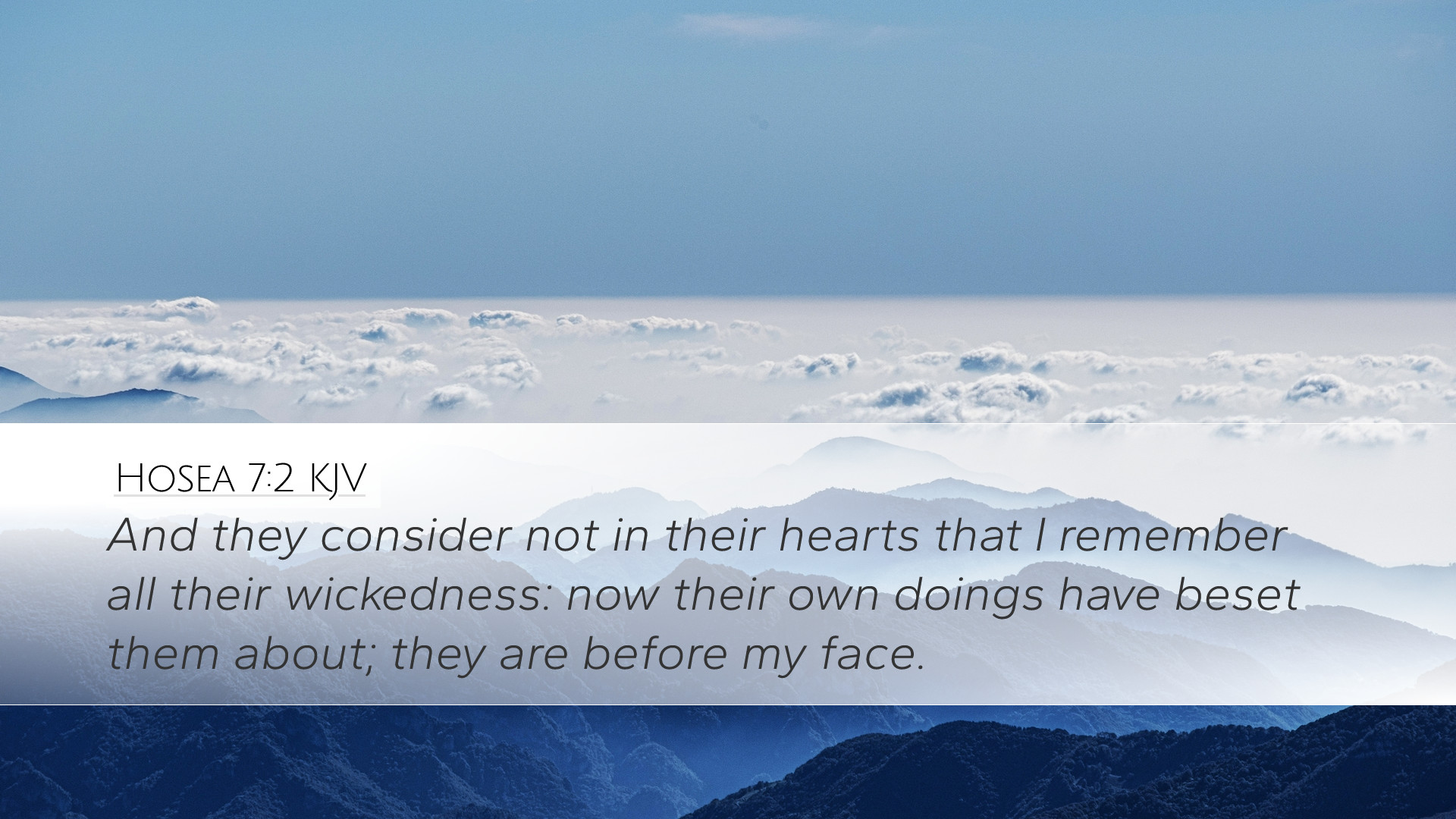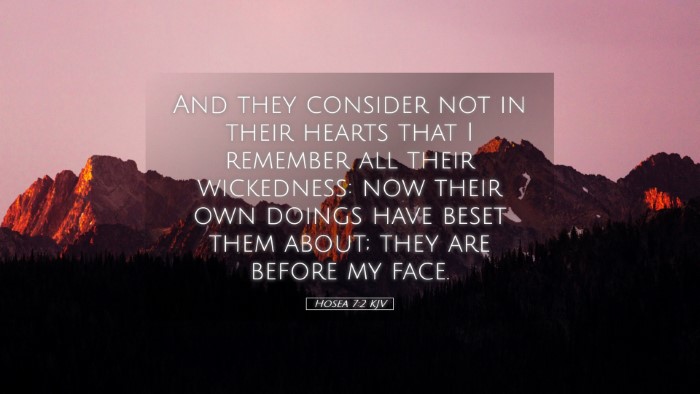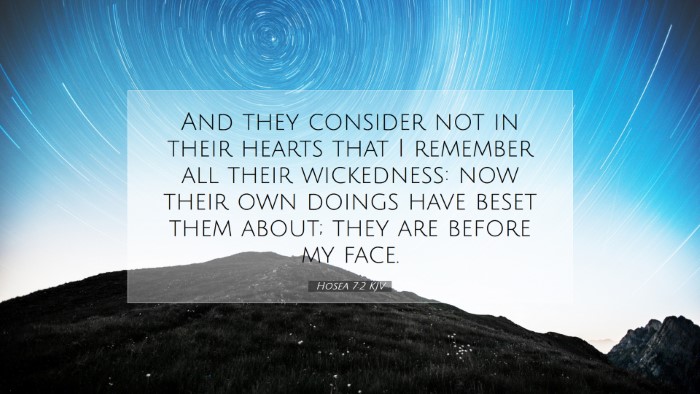Old Testament
Genesis Exodus Leviticus Numbers Deuteronomy Joshua Judges Ruth 1 Samuel 2 Samuel 1 Kings 2 Kings 1 Chronicles 2 Chronicles Ezra Nehemiah Esther Job Psalms Proverbs Ecclesiastes Song of Solomon Isaiah Jeremiah Lamentations Ezekiel Daniel Hosea Joel Amos Obadiah Jonah Micah Nahum Habakkuk Zephaniah Haggai Zechariah MalachiHosea 7:2
Hosea 7:2 KJV
And they consider not in their hearts that I remember all their wickedness: now their own doings have beset them about; they are before my face.
Hosea 7:2 Bible Commentary
Commentary on Hosea 7:2
Bible Verse: "And they consider not in their hearts that I remember all their wickedness: now their own doings have beset them about; they are before my face." (Hosea 7:2)
Introduction
The verse from Hosea 7:2 serves as a poignant reminder of God's omniscience and accountability regarding human actions. The text highlights Israel’s moral and spiritual decline during a time of great apostasy. Through various dimensions of interpretation from prominent public domain commentaries, we dive into the theological implications of this verse, considering its relevance for contemporary readers, scholars, and preachers.
The Context of Hosea
The book of Hosea is set against the backdrop of Israel's unfaithfulness to God, personified through the prophet's tumultuous marriage to Gomer. This prophetic literature articulates God's longing for His people amidst their infidelity. Gods’ covenant relationship with Israel serves as the canvas upon which the themes of judgment and mercy are painted. As Matthew Henry provides insight, this verse pinpoints Israel's ignorance of their plight and, through divine revelation, sheds light on their need for repentance.
God's Memory and Human Actions
-
Divine Omniscience:
Hosea 7:2 reflects God’s perfect memory of every wicked act. Albert Barnes emphasizes that, unlike humanity, God's remembrance is not merely passive; it is active and God’s knowledge extends to all that occurs within His creation. This serves as a powerful reminder to those who may feel disillusioned with the justice of God; He is fully aware of the transgressions of His people.
-
Consequences of Sin:
Hosea notes that the sins of Israel have “beset them about.” Adam Clarke illustrates this with the imagery of a trap or a net, indicating how their own wickedness has enveloped them. The idea conveys that sin naturally leads to self-destruction and bondage, manifesting in societal decay and loss of divine favor.
-
The Role of Human Agency:
The verses reveal that while God remembers sin, human beings often fail to reflect on their transgressions. Matthew Henry notes that hearts hardened in sin lead to spiritual blindness, rendering them incapable of perceiving the devastating consequences of their actions. For pastors and students of theology, this underscores the necessity of self-reflection and repentance in maintaining a righteous walk with God.
Theological Implications
-
Reality of Judgment:
This verse signifies the certainty of divine judgment. Hosea addresses a people who feel secure in their sinful ways, unaware that their continued disregard for covenant refrains will inevitably lead to their ruin. This poses a critical challenge for contemporary readers: to recognize and repent from sin before it binds and besets them beyond recovery.
-
The Nature of Repentance:
Repentance is a recurring theme throughout Hosea's prophetic message. Adam Clarke emphasizes that genuine repentance involves an acknowledgment of sin and a return to God. As this verse articulates—remembrance must lead to contrition and action. Pastors are encouraged to articulate this principle to their congregations, reminding them of the call to turn from their ways.
-
God's Persistent Love:
Despite judgment looming, God's love remains evident in His desire for His people to turn back to Him. Instead of immediate destruction, He seeks repentance, emphasizing that while sin has consequences, there is grace for those willing to return. This aspect can be pivotal for theological discussions around grace and mercy, particularly in pastoral counseling contexts.
Application for Contemporary Followers
The message of Hosea 7:2 transcends time, demanding personal and communal reflection. Here are some applications based on the insights gained:
- Introspection: Encourage congregants to engage in regular self-examination, contemplating their own lives in light of God’s word.
- Awareness of Consequences: Remind believers that irresponsibility towards sin leads to serious repercussions not only in their spiritual lives but also in community well-being.
- Embracing Repentance: Foster an environment where confession and repentance are vital, promoting healing and restoration in the church community.
Conclusion
Hosea 7:2 starkly illustrates the intimate relationship between divine knowledge and human responsibility. It calls to attention the grave nature of sin and highlights the constant presence of God in every facet of human conduct. Through the teachings of Matthew Henry, Albert Barnes, and Adam Clarke, we are reminded that the path to restoration begins with a heart attuned to God, leading to an awakened conscience and a renewed commitment to Covenant fidelity.


